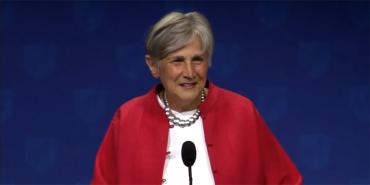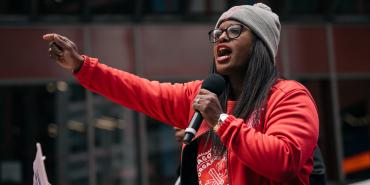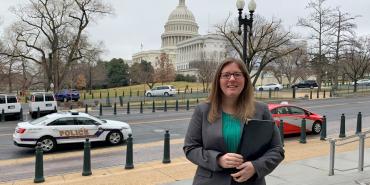The AFT honored Diane Ravitch with its Women’s Rights Award on July 30, recognizing a long and close partnership with this prolific writer, historian and policy leader in the fight for public education. Ravitch, who is a research professor of education at New York University and president of the Network for Public Education, then joined a panel discussion on the state of public education with Stacy Davis Gates, vice president of the Chicago Teachers Union and executive vice president of the Illinois Federation of Teachers, and Tega Toney, AFT-West Virginia’s vice president and president of AFT-Fayette.
“For more than 40 years, Diane has been a champion of public education, a stalwart fighter against the privatization of public schools and a steadfast advocate of the professionalism of educators,” said AFT President Randi Weingarten. Noting that the majority of teachers are women, Weingarten continued, Ravitch “speaks truth to power and does not sugarcoat the fact that women are still underpaid, undervalued and underrepresented, even though they do some of the most important work in this country.”
Ravitch “correctly points out that the crisis we are facing in public education is not because of a crisis of academic achievement, but rather a concerted effort to destroy our public schools and undermine the teaching profession,” Weingarten said.
The panel discussed how attempts to undermine educators have lost momentum in recent years: The public has risen up to support public education, as teachers have gone on strike to secure the resources students need—like counselors, librarians and school nurses—and worked for pro-public education policy changes.
“In 2018 in West Virginia, when [educators] went out on strike, I suddenly got hit by a thunderbolt about how everything was changing,” said Ravitch, whose most recent book, Slaying Goliath: The Passionate Resistance to Privatization and the Fight to Save America's Public Schools, is sure to inspire even more people to mobilize for public education. “All the parents rose up and said, ‘we value our schools,’ ” she said. “The narrative changed from bad teachers and bad apples … to, ‘our teachers are undervalued, under-respected and underpaid, we need to spend more money on public education and stand against privatization.’ ”
Toney recalled feeling the power of that shift on the ground. It began after the 2016 election, grew as a reaction to U.S. Secretary of Education Betsy DeVos’ destructive policies, and crested as anti-public education rhetoric overwhelmed dedicated teachers. “We had been overworked and undervalued for far too long, and we were not going to take it anymore,” she said, adding that educators rallied support from their communities and “the community was on board.”
In Chicago, Davis Gates said, “teachers are common-good practitioners,” and so the union is firmly rooted in the community. “Our organizing work is grounded in what Black children need, what Latinx children need, what immigrant children need. But children aren’t one unto themselves; they exist in families, they exist in communities.”
That makes it essential for the union to help find solutions for the 20,000 homeless students in Chicago, and to demand broadband services so that every family has access to remote learning during the pandemic. Rather than “shrink” away from new opportunities to create justice and equity, Davis Gates said, “we’ve got to get bigger and we’ve got to get aggressive.”
Toney echoed that approach: Her union is striving to eliminate “broadband deserts,” advocating to recruit and hire more teachers of color and working to end food insecurity. “We have to be the watchdogs for democracy, for economic justice, for racial justice and healthcare justice,” she said. “Our union is here for this moment and for this purpose.”
Ravitch envisions a post-pandemic world with public school systems that are “better than ever,” supported by a newly elected president—Joe Biden. She wants to leave behind the high-stakes testing of previous administrations and embrace “a new vision for education” that is focused on children and the well-being of their families and communities—and on addressing the “tremendous inequities” described by Davis Gates and Toney.
“Our union in Chicago is clear about what liberation looks like,” said Davis Gates, calling upon the labor movement to ally itself to the movement for Black lives. “We have to work within the communities where we’re located,” she said, noting that austerity is on its way, threatening larger class sizes, and schools without librarians and art. “Our work is to make sure that the communities where our schools are anchored have what they need.
“We can destroy the system of oppression. That’s our work in this moment.”
[Virginia Myers]



